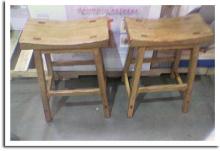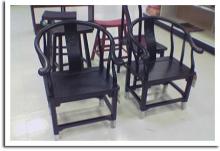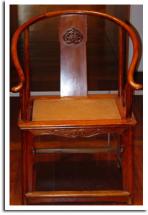Every time I visit China, I always see Western families in the hotel lobby with their Chinese adopted children in tow. If you ever wonder what exactly become of them, how they are doing, and what struggles and challenges they face, here’s an interesting essay I found by Elizabeth Holmes, a Chinese adoptee, who won second prize in the Celebrate Diversity! Essay Contest. Read Elizabeth Holmes’ Essay on Culture, Identity and Heritage.
Author: Ken Chan
-
Macao Leaving Las Vegas Behind
New York Times: Macao Surpasses Las Vegas as Gambling Center. Macao surpassed the Las Vegas Strip to become the world’s biggest gambling center in 2006, measured by total gambling revenue, according to industry analysts and government figures released today.
I suppose this is good news if you own or run a casino in Macao. But, the last time I was in Macao, I just found the place to be utterly depressing. The place offers none of the glitz of Vegas. I walked into one casino and the first thing I saw was the pawn shop with all the watches that people had to leave behind to meeting their gambling obligations.
-
No More Pearl Milk Tea
I love the pearl milk tea at Fantasia Coffee & Tea. My favorite flavors are taro and red bean. However, a recent study may give pearl milk tea lovers some pause. While drinking tea can reduce the risk of heart disease and stroke, these benefits do not extend to drinkers of pearl milk tea, also known as tapioca milk tea or boba milk tea. As it turns out, when milk is added to tea, it cancels out the protective effect that tea drinking has against cardiovascular disease. Maybe next time I’ll ask them to hold the milk.
-
Ancient Chinese Bar Stools
 As if seeing Chinese furniture at Target wasn’t enough, i head to Costco and find the same. However, they were passing these off as bar stools. I’m sure that’s not what these types of chairs are called in China though. Where next? Crate and Barrel?
As if seeing Chinese furniture at Target wasn’t enough, i head to Costco and find the same. However, they were passing these off as bar stools. I’m sure that’s not what these types of chairs are called in China though. Where next? Crate and Barrel? -
Antique Chinese Chairs
 So, how do these chairs compare with the museum-quality one. Good from afar, but far from good? I couldn’t quite decipher the symbol carved on the back of the chair. Definitely did not appear to be anything I’ve seen before on any antique Chinese furniture. Oh, I found those chairs at Target. I also saw terracotta soldier replicas as well.
So, how do these chairs compare with the museum-quality one. Good from afar, but far from good? I couldn’t quite decipher the symbol carved on the back of the chair. Definitely did not appear to be anything I’ve seen before on any antique Chinese furniture. Oh, I found those chairs at Target. I also saw terracotta soldier replicas as well. -
Antique Chinese Furniture
 I love antique Chinese furniture. A great place to view antique Chinese furniture is along Hollywood Road in Hong Kong, which is packed with shops selling furniture, jades, fossils and other assorted antiques. Recently, I came across a couple stores in the United States selling “Chinese” furniture. I was surprised, as you will be, when I tell you where I came across a piece of Chinese heritage.
I love antique Chinese furniture. A great place to view antique Chinese furniture is along Hollywood Road in Hong Kong, which is packed with shops selling furniture, jades, fossils and other assorted antiques. Recently, I came across a couple stores in the United States selling “Chinese” furniture. I was surprised, as you will be, when I tell you where I came across a piece of Chinese heritage. -
9th Guangzhou Convention of Overseas Chinese Scholars in Science and Technology
 I attended the Guangzhou Convention of Overseas Scholars in Science and Technology last month in Guangzhou, China. Needless to say, my most recent trip to China left me extremely impressed. Here’s a quick run down of the hits and misses.
I attended the Guangzhou Convention of Overseas Scholars in Science and Technology last month in Guangzhou, China. Needless to say, my most recent trip to China left me extremely impressed. Here’s a quick run down of the hits and misses.- The Convention. Very organized. Had no problems with the convention, the accommodations or the transportation. A lot of companies staffed a booth at the convention. Though, for a country the size of China, I was expecting a bigger crowd—something akin to a MacWorld convention. Guangzhou seemed much more accessible than during my prior visit. In fact, I was a bit hesitant to attend the convention at first because of my prior memories of being stuck in a Guangzhou traffic jam many years ago. I am now a convert.
- Guangzhou Subway. The subway took us directly from the China Hotel to the Guangzhou International Convention and Exhibition Centre. The subway automatically announces station stops in Chinese and English. Very convenient, especially since the Convention provided a free subway pass to travel between the hotel and the convention hall, and to move about in Guangzhou. The subway colors were a bit spartan though. A splash of color would certainly have warmed up the place.
- Xiaolingtong (å°çµé€š). The Convention provided free mobile phones to participants. Had read about xiaolingtong in the press for quite some time, but this was my first time using it. We were given a stripped down cell phone that vaguely resembled my first cell phone in functionality. No advanced features, but very compact and probably all I needed for a 3 day convention.
- Friendship Store. The Friendship Store from the 80s had disappeared. Instead of traditional Chinese goods, this new edition sports Western brands. I even learned that Henckels sells cookware. I’ve only seen Henckels knives in the United States. Could certainly use a Friendship Store in my neighborhood. 🙂 However, I’m not sure who their target audience is. Seems to me that Chanel is a bit expensive for the average (and even above average) Chinese. As for foreigners, who heads to China to buy American and European goods?
- Taxis. The great thing about traveling in Hong Kong and Guangzhou is that taxis are a viable alternative to the subway system. You can get around very cheaply in a taxi, unlike in the United States.
- Traffic. YouTube has a video on India traffic. Guangzhou wasn’t as crazy, but it did leave me baffled at some points. I simply cannot understand motorcycles driving on the sidewalk.
- Follow Hong Kong. This year, Hong Kong finally started banning smoking in most public spaces. I returned to the United States before I could benefit from the new law. Hopefully, this trend will spread to China.
- Skyscrapers Aplenty. The only thing reaching for the sky were the buildings. Mature trees were far and few between. Need to plant more trees so that the city dosn’t become a concrete jungle—like Los Angeles.
- Smog. Haven’t seen such brown haze since I left Los Angeles. And, even in L.A., the smog only obscured the faraway mountains. In Guangzhou, even nearby buildings didn’t appear clearly. Indoor smoking and outdoor pollution. Yuck!
- Growth Trend. Each time I visit China, I am surprised by its most recent accomplishments. It’s not the United States, and not even Hong Kong. But, give it a decade or two to grow and iron out some of its problems and it’ll be close.
-
Top 8 Reasons to Learn English
The United States requires applicants for naturalization to be able to read, write, speak, and understand English. However, the U.S. exempts older applicants who have resided in the United States as a lawful permanent resident for a long duration or those with a medical impairment that affects their ability to learn English. While green card holders that qualify for one of the above exceptions do not have to learn English to become a U.S. citizen, they should not view the exception as an excuse not to learn English. Being a U.S. citizen and being able to fully partake in the benefits of American society are two separate issues. The advantages of being able to communicate in English are numerous:
- America the Beautiful. You need to learn English if you want to travel outside of Chinatown. Though, many Chinese old timers may sniff at America the Beautiful. China has more history. The Grand Canyon can’t even compare to Guilin. They’ll even tell you all the great things about living in China while their two feet are firmly planted in U.S. soil. Learn English. Be adventurous. Visit the national parks and soak in the grandeur of America.
- Cold Hard Cash. Sure, there are jobs available to those who can only speak Chinese. So, technically, you don’t even have to speak English to find a job in America. But, why limit yourself to only seeking Chinese-speaking jobs? A little investment in education, pays dividends.
- Good Health, Long Life. Even when you visit your Chinese-speaking doctor, the prescription will be written in English. Learning English lets you understand what medicine was prescribed. You need to understand the proper dosage and side effects of all medicines you take.
- Law and Order. If you ever get into an accident or are a victim of a crime, you need to be able to communicate clearly with the police or fire department. Sure, some departments may have Chinese-speaking interpreters available. But, the unavailability of an interpreter during a critical situation could jeopardize of you or a loved one.
- Education. Education is a bedrock of the Chinese culture. To properly communicate with your children’s teachers, you need to understand English.
- Descendents. Your children were dutiful enough to continue your family line. But, these young rascals speak English! If your grandchildren grow up in the United States, they will face a challenging time holding onto their Chinese language. If you wish to communicate with them, teach them Chinese but also learn English on your own so you can meet them half way.
- Chinatown Has Moved. The Chinese American population has dispersed all across America. Life in the suburbs means all the stores and services usually are not within walking distance anymore. The further you have to travel, the more likely you will need English to read road signs or interact with others. Oh. Make that another reasons to complain about the United States. Back in China, I can just go downstairs and…
- Learning for Learning’s Sake. Sometimes, you shouldn’t need a reason to learn something. As a human being, you are blessed with a brain that is designed to learn new skills. If you start refusing to learn new skills just because there’s no reason to, well, then America probably isn’t the place for you.
-
Google Patent Search Gives Glimpse Into U.S. Racist History
 This week, Google launched Google Patent Search, which lets you search the entire collection of patents made available by the USPTO. As of the launch date, Google Patent Search covered patents issued from the 1790s to the middle of 2006. Now, this is not the first patent search engine, so let’s take a look and compare them.
This week, Google launched Google Patent Search, which lets you search the entire collection of patents made available by the USPTO. As of the launch date, Google Patent Search covered patents issued from the 1790s to the middle of 2006. Now, this is not the first patent search engine, so let’s take a look and compare them.I ran a search for “chinaman” on the USPTO website (4 matches), on the Patent Storm web site (3 matches) and on the Google Patent Search website (17 matches).
Aside from the fact that Google found more matches than these other two services, I was also surprised that there were any matches at all. Now, you may be curious to see what types of patents will invoke the term “chinaman.” After all, when we think about patents and intellectual property, our minds naturally gravitate towards cutting edge inventions and not racial slurs.
But, sure enough, Patent Number D12733 for a Design for a Toy for Exploding Caps and Fulminates shows a “Chinaman walking or running along the said barrel-like portion of the hand-piece” and an Irishman with a leg acting as the hammer “which operates with a kicking movement.” The inventor also asserted, “My design . . . makes the toy a source of great amusement to children using it.” On the handle of the toy gun are the words: “The Chinese Must Go.” Presumably, this won’t be a great source of amusement to Chinese children.
-
Bad Loan or Bad Financial Decisions
The Los Angeles Times ran an interesting article today on pay option loans. Essentially, these home loans work just like credit cards in that each month the lender only requires a minimum amount due. This minimum amount though does not even cover the interest due, leading to negative amortization. In other words, by just paying the minimum amount due, the borrower owes more and more each month.
One conclusion you can reach is that negative amortization loans are bad. However, the real lesson I see is the danger of throwing good money after bad. Let’s take a look at the article. The homeowner bought a house in Corona 11 years ago. In that time, his house appreciated in value, growing from $129,995 to over $400,000. The lesson could have been about a savvy real estate investor. Instead, the borrower proceeded to strip out the equity from his house to pay off credit card debts, purchase a car, travel internationally, and invest in stocks and commodities.
Let me restate this. The homeowner pulled money out of an asset that had tripled in value for him over 11 years, and poured it into discretionary spending and investments that ended up losing money for him. Therein lies the big lesson here. You don’t have to read Rich Dad, Poor Dad to figure what went wrong here.
Taking cash out when refinancing isn’t like withdrawing money from your bank account. You take $40 out of your checking account at the ATM and the money is yours. You take $40,000 out when refinancing and you have to pay the money back. That’s the difference.
Los Angeles Times:
A Loan That’ll Get Ugly Fast